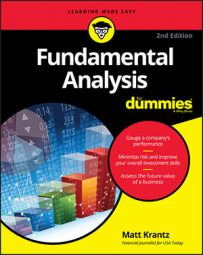- Vulnerability to wrong data, including your assumptions: Fundamental analysis is heavily based in fact. But if a company incorrectly reports data or you misinterpret them, you're going to have a false conclusion. Miscalculations are especially likely when making assumptions about things like a company's future growth rate, future interest rates, or profits. Even fundamental analysts are human, you know.
- Overreliance on past data: Perhaps the biggest knock against fundamental analysis is how much weight it puts in a company's past performance. There is some truth to that, because numbers companies report can be a month or more old. However, true fundamental analysis uses historical numbers to make an educated guess about the future.
- Bad timing: Say you do all the homework in researching a stock. You find a stock that appears to be a screaming buy, so you buy it. Guess what? A stock can remain a screaming buy for many years or even decades until investors come to the same conclusion. Fundamental analysts often have to be wrong for a long time before making money.
- Betting against the market: If you buy a stock because you think it's a steal, you're in effect betting against thousands of the most sophisticated trading desks around the world with access to the same data. If you think a stock is too cheap, you're making the gamble that other investors are missing something you can see.
- Concentrated positions: If you're going to the trouble to meticulously study a company, you're going to want to make sure you're positioned to profit if you're right. Unless you have a team of analysts working for you, when you find a stock that fits your fundamental criteria, you're going to want to own a large chunk of it. As a result, investors who use fundamental analysis may have large exposure to individual companies.
This concept contradicts the idea of diversification, which is owning hundreds and hundreds of small pieces of many companies. With diversification, you're spreading your risk over many companies so if one has a problem, it doesn't hurt so badly. Fundamental analysts, though, think that owning just a few investments that you know inside and out is actually safer than owning everything.

